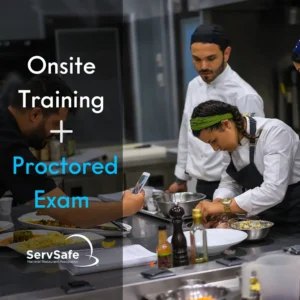In the fast-paced world of the restaurant industry, maintaining impeccable food safety standards is non-negotiable. While initial food safety training is crucial, ongoing training is equally important to ensure that staff remain updated on the latest practices, regulations, and technologies. This blog will delve into why continuous food safety training is essential for your restaurant and how it can benefit your business, your staff, and your customers.
Keeping Up with Changing Regulations
Benefits
- Compliance with Current Laws
- Food safety regulations are constantly evolving, and staying compliant is essential to avoid legal issues and fines.
- Example: A new regulation may require specific allergen handling procedures, and ongoing training ensures that your staff is aware of and compliant with these changes.
- Staying Ahead of Industry Standards
- Ongoing training helps your restaurant stay ahead of industry standards, demonstrating your commitment to excellence and safety.
- Example: Adopting advanced food safety technologies and practices before they become mandatory can give your restaurant a competitive edge.
Reducing the Risk of Foodborne Illnesses
Benefits
- Consistent Implementation of Best Practices
- Regular training reinforces best practices, reducing the risk of foodborne illnesses caused by lapses in food safety protocols.
- Example: Continuous reminders and training sessions on handwashing techniques can prevent contamination and the spread of pathogens.
- Addressing Common Mistakes
- Ongoing training helps identify and correct common food safety mistakes, ensuring that errors are not repeated.
- Example: Refresher courses on proper food storage temperatures can prevent spoilage and contamination.
Enhancing Employee Skills and Confidence
Benefits
- Skill Development
- Regular training sessions help employees develop and refine their skills, making them more proficient in their roles.
- Example: Advanced training on new kitchen equipment or updated cooking techniques can enhance overall efficiency and food safety.
- Boosting Confidence
- Well-trained employees are more confident in their abilities to handle food safely and address potential issues.
- Example: Confident staff are more likely to take initiative in maintaining a clean and safe kitchen environment.
Improving Customer Satisfaction
Benefits
- Building Trust
- Demonstrating a commitment to ongoing food safety training builds trust with customers, assuring them that their health is your top priority.
- Example: Displaying food safety certifications and training completion certificates can reassure customers of your dedication to safety.
- Positive Reviews and Reputation
- Consistently high food safety standards lead to positive customer experiences, resulting in good reviews and a strong reputation.
- Example: Satisfied customers are more likely to leave positive reviews online, attracting more business.
Minimizing Operational Risks
Benefits
- Preventing Costly Incidents
- Ongoing training helps prevent incidents such as foodborne illness outbreaks, which can be costly and damaging to your business.
- Example: A well-trained staff can identify and address potential hazards before they become serious problems.
- Preparedness for Inspections
- Regular training ensures that your staff is always prepared for health inspections, reducing the risk of violations and penalties.
- Example: Staff who are well-versed in food safety protocols are more likely to perform well during surprise health inspections.
Fostering a Culture of Food Safety
Benefits
- Creating a Food Safety Mindset
- Continuous training fosters a culture of food safety within your restaurant, where every employee understands and prioritizes safe food handling.
- Example: Regular team meetings to discuss food safety topics can keep the importance of these practices at the forefront of employees’ minds.
- Encouraging Accountability
- A culture of food safety encourages employees to hold each other accountable, ensuring that everyone adheres to best practices.
- Example: Staff members are more likely to remind each other about proper handwashing or food storage practices in a culture that values food safety.
Conclusion
Ongoing food safety training is not just a regulatory requirement; it is a vital investment in the success and reputation of your restaurant. By keeping up with changing regulations, reducing the risk of foodborne illnesses, enhancing employee skills and confidence, improving customer satisfaction, minimizing operational risks, and fostering a culture of food safety, you can ensure that your restaurant remains a safe and trusted place for your customers to dine.
At Food Safety Boston, we offer comprehensive ongoing training programs tailored to your restaurant’s needs. Contact us today to learn more about how we can help you maintain the highest standards of food safety and keep your staff well-prepared and knowledgeable.




